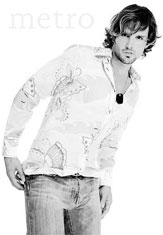Metrosexual: 9 Chinese Translations
When I mentioned a presentation on homosexuals in the West for my critical discourse analysis class, I gave the Chinese translation of “metrosexual” as 都市玉男. That’s not the only translation, though. In his research, Pepe turned up quite a few other translations currently in use online. Here are the ones Pepe collected, along with their literal meanings:
“Metrosexual”
1. 都市玉男 city jade man
2. 都市美型男 city beauty type man
3. 都市中性美男 city neuter beauty man
4. 都会美直男 city beauty straight man
5. 都市生活自恋者 city life narcissist
6. 花样美男 variety beauty man
7. 花色美男 variety beauty man
8. 雌性男人 female man
9. 后雅痞 post yuppie
Translation Notes
1. 都市 means both “city” and “metropolis,” as does 都会.
2. 美 could also be translated “beautiful” in all instances above
3. The same word “variety” was used for both 花样 and 花色, even though they’re different words. When examined at the character level, both contain the “flower” character, but the latter also contains 色, which in other words can mean “color” or something close to “sex.” I’m not sure exactly how the use of these words impact the feel of the Chinese translation.
Translation into Chinese can be pretty tough. I do find it very interesting to see the variety of translation attempts when a new, diffult to translate English word appears in Chinese media. Usually a certain period of time is required while society settles on one or two, effectively pushing out the rest, which are then are mostly forgotten by society.
After several years of hype, the whole metrosexual fad seems to be dying, and the English word might just die with it. If it does fall out of usage, though, that doesn’t necessarily mean its corresponding Chinese translation will. The Chinese might decide to keep the word around for their own purposes. Time will tell.


Seeing this just makes me think of Southern California so called men walking around saying “Duuuuuude” or “Wooooow”.
Marketing and fashion needed to figure out another way to sell more stuff to numerous men who lack self confidence and individula style, so I guess this was the next logical step. No Worries tho cuz you won’t find me walking around the world carrying a “YSL man purse”.
Don’t want to sound like a smartass or amything, but I do believe the 花 in both 花样 and 花色 means flowery. ‘花一样的美男子’, as they call it.
The spokesmen for ‘flowerily beautifu men’ would be F4, which stands for ‘Flower 4’. F4, of course, got their name from a hit Japanese manga series ‘花より男子’.
It adds up, doesn’t it?
Just the other day I caught a guy on telly doing a demonstration on how to apply make-ups on blokes. And he did NOT seem like a typical metrosexual type of guy at all. He looked like your average beer drinking, sports addicting, poker playing, porn watching, normal type of guy. Well, he was normal until he finished doing his mascara and moved onto lip gloss.
NOT SEXY!
Not sure if this is related, but in south Vietnam the equivalent to metrosexual may be “lady man” . This is pretty confusing for the locals, because in Many parts of the world, Lady’s Man has it’s own meaning. Lady Man, Lady’s Man: there’s just the difference of an “s”. Depending on one’s orientation, one may not want to go around vietnam proclaiming that one is a Lady’s Man. But then, vietnam is a pretty confusing place!
Its interesting to see how some of them seem to have entered the language from people who approved of or were trying to promote the trend (都市玉男) versus more dismissive interpretations (雌性男人)
I don’t know how they say “metrosexual” in Japan (any idea John?), but it’s almost certainly just a transliteration of the English word. Not nearly so interesting 🙂
KT: Are you sure “lady man” in Vietnam doesn’t refer to a (male-to-female) transgender person? This is a particularly well-known phenomenon in Thailand, for example, where such people are called “lady boys” or “kathoey”. This is very, very different to the concept of metrosexual.
Most of my translation work involves contracts of various sorts. It would make for much more interesting work to run across something like this:
甲乙两方同意甲方是一个都市中性美男
Interesting ABC article (and I won’t go into Chinese “metrosexual” translations cuz my Chinese sucks). Recently, I watched the Casion Royale trailer, and even the most metrosexual of men–007–has suddenly become a lot more macho than before, with bulging muscles and open-necked shirts!
Zheng,
But the Chinese words 花样 and 花色 don’t necessarily evoke associations with flowers, whereas I feel that “flowery” in English does, or at least to a greater extent.
Steve,
Exactly! I think in some cases they’re choosing to emphasis a certain aspect of the definition, but in other cases it may just be that they’re working from different definitions.
Todd,
The Japanese translation for metrosexual appears to be メトロセクシャル, a standard transliteration. (The #1 Google hit is “metrosexual a go go!” a Japanese blog.)
Hello, I love your blog! I speak Shanghainese (but no Mandarin, sigh) and I found all your entries really interesting. Even more interesting was when I checked your “About Me” page and discovered that you’re from Florida and graduated from UF, since I’m attending UF too! Anyways, just wanted to compiment you and tell you that it’s so nice to read your open-minded approach to Shanghai/Chinese culture.
Todd,
Yes, pretty sure that “Lady Man” in VN is distinct from “Lady Boy” of thailand. Vietnam is much less permissive than Thailand. And much less experimental.